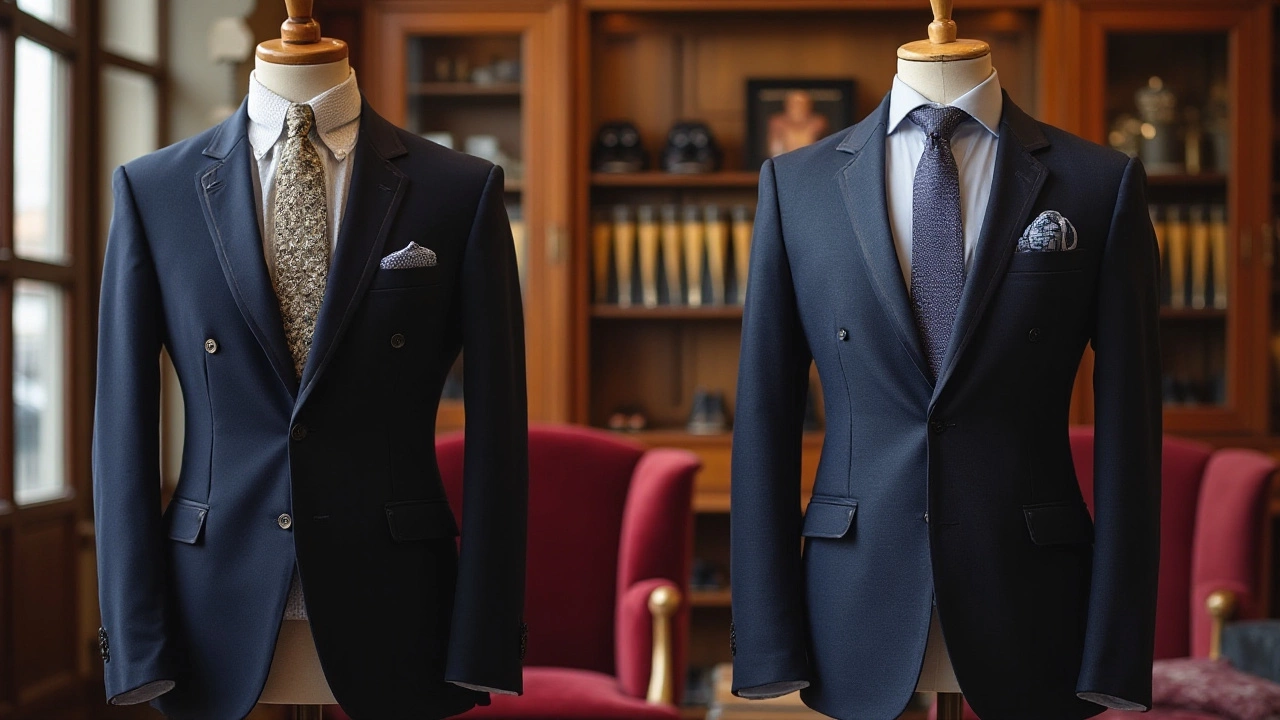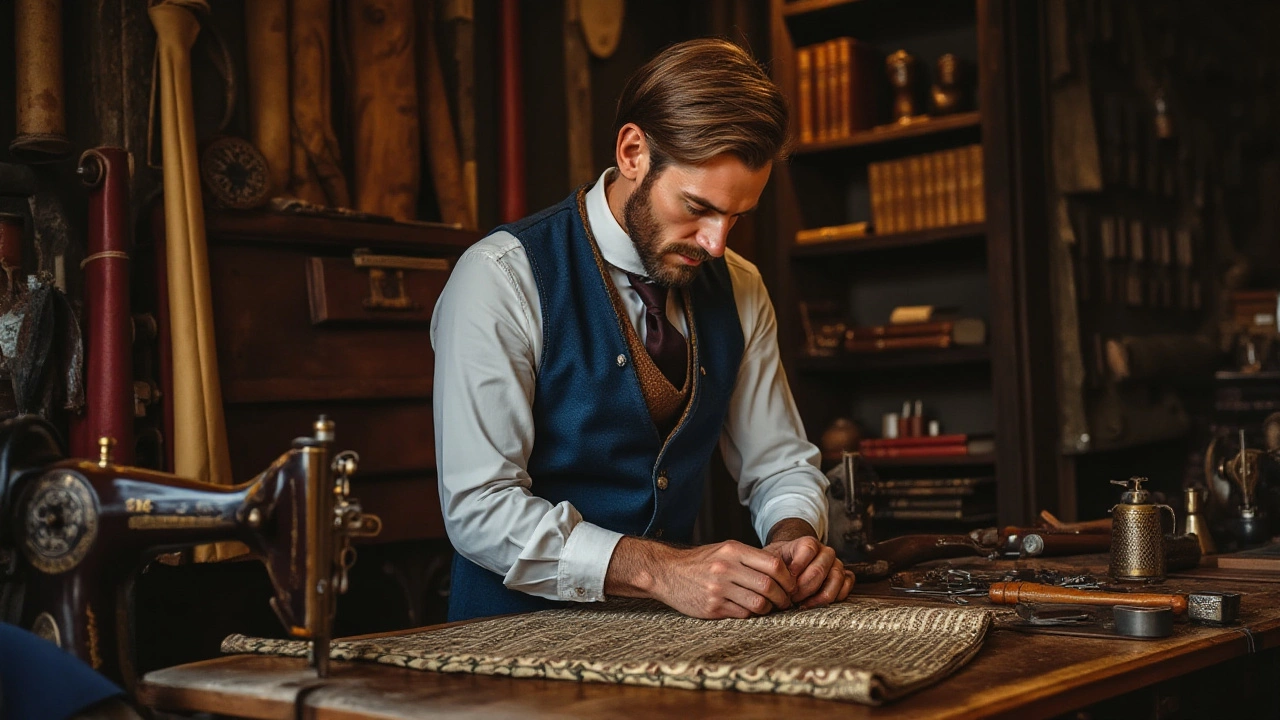When it comes to men's fashion in Ireland, the decision between hand-sewn and machine-sewn suits can be as personal as the selection of the perfect pint at your local pub. Each choice offers unique advantages, often reflecting a balance between tradition and modernity. Irish culture, rich with history and heritage, finds itself woven into the very fabric of handcrafted suits, which capture the essence of bespoke artistry.
On the other hand, the contemporary pace of life might lead one to appreciate the precision and consistency that machine-made suits offer, reminiscent of the sharp efficiency found in Dublin's bustling business district. With countless options available, and an array of local tailors ready to craft your perfect garment, the world of Irish tailoring is both diverse and fascinating. Whether you're attending a wedding in Dingle or closing a deal in Galway, understanding the nuances of what makes these suits extraordinary is key to making the right choice.
- The Art of Handcrafted Tailoring
- Precision of Machine-Made Suits
- Irish Tailoring Traditions
- Local Tailors and Brands
- Choosing the Right Suit for Your Needs
The Art of Handcrafted Tailoring
In the world of bespoke tailoring in Ireland, crafting a hand-sewn suit is akin to creating a masterpiece. Each stitch tells a story, woven with skill and precision by tailors who have often spent decades honing their craft. This personalized process distinguishes a hand-sewn suit, offering a level of craftsmanship that is both a labor of love and a testament to traditional techniques. At the heart of this tradition lies the tailor's ability to customize every detail to the wearer's unique measurements and personality, creating a garment that's not just a piece of clothing, but a statement.
The intricate art of hand-sewing a suit begins with choosing the perfect fabric, a decision that can make or break the final outcome. Irish master tailors might guide you through this choice, offering insights into various weaves and weights, which help in perfecting the drape and flow of the suit. Each fabric swatch is like a canvas, full of potential and waiting to be shaped. The cutting process is done painstakingly by hand, each cut precise, ensuring that the fabric's pattern aligns perfectly.
One of the distinguishing characteristics of hand-sewn suits is the full-canvassed construction, which grants the suit a natural, flowing look that machine-sewn alternatives often can't match. This method allows the suit to adapt to the wearer's shape over time, resulting in a fit that gets better with age. It's not uncommon for tailors to include almost 50,000 stitches in a single jacket, each contributing to the garment's overall integrity and form. An experienced Irish tailor might spend weeks on one suit, investing time and attention to each small detail.
The lapels of a handcrafted suit are often shaped through a process known as pad-stitching, an artful practice wherein the lapel is repeatedly hand-stitched to create a graceful roll. This technique speaks volumes about the artisan's dedication to detail. The sleeves, too, are set in by hand, allowing for a more traditional movement and comfort, and the buttonholes are nestled by handcrafted stitching, often with silk thread that echoes the suit's sophistication. These nuances might be invisible to the untrained eye, but they embody a heritage of painstaking expertise.
In a nod to the sensory experience, many bespoke suits boast exquisite linings that add a touch of flair and luxury. Traditional Irish materials, such as tweed or herringbone, can offer not only elegance but also a warmth that is especially valuable in the tempestuous Irish climate. Indeed, it's these customizable elements that invite wearers to express parts of their identity, limited only by imagination.
As noted by the renowned Irish tailor Patrick H. O'Connor, “A handmade suit isn't just tailored to fit a man's body; it's designed to fit his soul.”This sentiment captures the essence of what makes the hand-sewn suit a timeless favorite among sartorial enthusiasts. Such intimate craftsmanship requires both passion and patience, traits that are abundant in the tailoring tradition across the Emerald Isle.
Hand-sewn suits have a luxury and durability that make them worthy investments. Their ability to weather the tests of time, emerging anew with each wear without losing their charm or structure, is enchanting. In an era where fast fashion dominates, the enduring appeal of a handmade suit resonates powerfully, especially within Irish tailoring circles where tradition is cherished and celebrated.
Precision of Machine-Made Suits
The evolution of the machine-sewn suits has revolutionized the fashion industry, offering an unmatched precision that many men in Ireland and beyond have grown to appreciate. While the romantic appeal of a hand-stitched suit is undeniable, machine-made suits present a compelling case for those who value efficiency, consistency, and affordability. These suits are crafted with cutting-edge technology that ensures each seam, each hem, is executed with exact symmetry, which is particularly essential for the sleek, modern silhouette favored in today's fashion scene.
Unlike their handcrafted counterparts, machine-sewn suits benefit from the wonders of modern machinery, which can replicate designs with extraordinary consistency across multiple pieces. This technology is advantageous, especially for those who prefer a uniform look throughout their wardrobe or for businesses that require a polished, consistent appearance for their team. In the context of Ireland's fast-paced urban centers, such as Dublin, where time is a luxury and practicality is king, the benefits of machine sewing are clear.
The process begins with digital pattern-making. High-tech software analyzes body measurements with millimetric precision, ensuring that the resulting garment will fit like a glove. This sophisticated level of accuracy was once solely the domain of tailors with years of experience and an intuitive understanding of fabric and form. It is no surprise, then, that machine-sewn suits have made tailor-made elegance accessible to a broader audience.
Aiming at providing quick solutions without sacrificing style, numerous Irish brands have embraced this technology, allowing them to produce suits that are readily available in a range of sizes, colors, and styles. Brands like Magee 1866 demonstrate how traditional Irish craftsmanship can coexist with modern techniques, bridging the gap between custom designs and readily available fashion.
"Efficiency drives the modern fashion industry, yet style remains paramount. Machine-made suits offer the perfect balance," says a leading expert from the British Fashion Council.
In addition, the speed of production allows consumers to stay abreast of fashion trends without lengthy waits. With automation, it's possible to churn out sophisticated designs in a matter of days, meeting the immediate needs of those who thrive in Ireland’s vibrant social and professional environments. This speed and precision come especially handy when there's a sudden change in weather—a common Irish dilemma—requiring a quick wardrobe update.
The environmental impact cannot be overlooked either. Machine manufacturing, when managed properly, can lessen material waste and energy consumption during production. Judiciously chosen durable fabrics can ensure longer-lasting wearability, aligning with Ireland's increasing focus on sustainability.
Yet, it is critical to recognize that machine-made does not equate to compromise in quality. High-quality materials and careful assembly ensure these suits compete head-to-head with the finest handmade options. With advancements in stitching technology, even minute details like buttonholes and linings come out impeccably, offering resilience and a touch of finesse. As technology continues to advance, we may only see enhanced capabilities in the world of machine-sewn suits, providing ever more options for Ireland’s sartorial enthusiasts.

Irish Tailoring Traditions
In Ireland, the tradition of tailoring is more than just a craft; it's an art form that has been shaped over centuries. The roots of Irish tailoring can be traced back to a time when every stitch was a story, each pattern a whisper of history. Throughout vibrant towns like Cork and Limerick, the allure of hand sewn suits remains strong, celebrated for their exceptional fit and unparalleled craftsmanship. This is a country where history and heritage are not just remembered but felt in every garment, where fabric selection is an experience and not just a choice.
Irish tailors are known for their meticulous attention to detail and an almost poetic understanding of fabric. They often use tweeds, linens, and wools sourced from local mills that have been producing for generations. Such materials provide not only warmth against the chill of an Irish winter but also a rustic charm that's hard to replicate. In the bustling markets of Dublin, the modern man can still find bespoke tailoring services that honor traditional methods. Recognizable names such as Louis Copeland & Sons remind us of the personal touch found in handmade garments. It's said that a Louis Copeland suit tells a story, a callback to the days when craftsmanship was revered and time wasn't a factor in creating excellence.
In recent years, there's been a resurgence in interest toward these traditional tailoring techniques, spurred on by a global movement seeking authenticity and sustainability. A well-tailored, bespoke suit is seen not just as a garment but an investment. It's no wonder that people often quote, "The best-dressed men of my acquaintance are though those who know themselves well enough to seek excellence," capturing a sentiment held deeply by Irish tailors today. The bespoke experience in Ireland extends beyond just the suit. It's a journey from the moment you step foot into a tailor’s studio, where lineage and lore are woven into the fabric of your choice.
The continued interest in hand-sewn garments, particularly in traditional styles, highlights a shift in consumer values toward uniqueness and quality. Many young professionals and style aficionados are turning to Irish tailors for suits that not only look good but also feel steeped in a rich narrative. Whether it's for a bridegroom's attire or a business meeting in a historic venue, the art of tailoring in Ireland still thrives because it caters to those who appreciate life's finer details. It's a powerful testament to the enduring power of true craftsmanship in a world where machine-made is often the default.
Local Tailors and Brands
In the heart of Ireland, where tradition and modernity meet, local tailors and brands have honed the art of crafting exquisite suits that remain close to the soul of Irish culture. While Dublin offers a bustling hub for fashion-forward thinkers, it is the bespoke tailors, like those found in Cork or Galway, that keep the age-old practices alive. These artisans take pride in meticulously creating hand sewn suits, each stitch carrying the weight of history and personal touch. The magic of a hand-sewn suit lies in the details—the carefully selected fabric, the precision of the cut, and the unique story woven into every garment.
Renowned brands like Louis Copeland & Sons have earned their place in the pantheon of Irish tailoring with generations of expertise. Established in Dublin, they've continued to serve everyone from the business elite to the eclectic artist, ensuring each suit tells its own saga. Another jewell on the Irish tailors crown is Magee 1866, originating from Donegal. Known for their luxurious tweeds, they've married tradition with innovation by incorporating modern designs and lighter fabrics without losing any of the renowned quality.
Liam Collins, a celebrated fashion columnist, once said, “A suit from an Irish tailor is more than just fabric; it’s a canvas of identity, carefully crafted to tell your own story.”These tailors and brands are not simply producing suits, but they are creating apparel that embodies a profound sense of personal style and cultural heritage.
For those seeking machine sewn suits, which offer speed and precision, there’s still finesse to be found in the Irish market. Take Benetti Menswear, for instance, known for their sleek, contemporary designs that don’t compromise on quality or attention to detail. They blend the predictability of machine production with a sophisticated design palette that caters to the modern Irish gentleman. Benetti’s mastery lies in creating suits that are perfectly tailored to those last-minute gala invites or business meetings as they ensure that one can look sharp and feel confident without the extended wait times of bespoke tailoring.
Choosing the right tailor or brand often depends on what one values in a suit—be it the handcrafted touch or the machine’s precision. Exploring local fairs, such as the National Tailoring Academy's annual showcase, can be insightful. Here, many Irish tailors come together, displaying their unique styles and innovations, providing an opportunity to connect directly with the artisans behind the garments. This celebration of fashion heritage offers a view into the diversity of styles present in the Irish market today, illustrating that while trends may come and go, the enduring craftsmanship of Irish tailoring remains timeless and true.

Choosing the Right Suit for Your Needs
When faced with the decision of selecting the ideal suit, whether it is a hand-sewn marvel or machine-stitched precision, a few key considerations come into play. It’s much like crafting a new identity: each thread, each component, has its own story to tell. A hand-sewn suit primarily comes into its own in terms of individuality and craftsmanship. Each bespoke piece is a journey, starting with that quintessential custom fitting session where the tailor's skill and experience transform a roll of fabric into a masterpiece molded around your physique. This method allows a person to express their unique sense of style, one stitch at a time. Contrast this with machine-sewn suits, which provide a more standardized fit but do so in a fraction of the time, providing the modern man with accessibility and convenience.
One must also consider the purpose for which the suit is intended. Is it for a formal affair, such as a wedding or a business meeting, where traditional craftsmanship might shine the brightest? Or perhaps it’s for an everyday office look or social gathering, where machine-sewn alternatives might offer more practicality and ease. The materials in play also significantly affect your choice. Hand-sewn suits often utilize artisanal fabrics that breathe better, becoming an extension of oneself. On the other hand, advancements in technology have enabled machine-sewn garments to feature materials that are both durable and stylish, offering resistance to the unpredictable Irish weather.
Cost, of course, is always a factor to be considered. A hand-sewn suit typically commands a higher price, reflective of the personalized service and time-intensive labor involved. Yet this investment can be viewed not just as purchasing a garment, but a piece of art. Machine-sewn suits, while often more affordable, do not lack for quality and are ideal for those needing something suitable without a wait. As Joe Kennedy, a renowned Irish tailor, once commented,
"A handcrafted suit is like a good story, told thread by thread, while a machine suit is a novel enjoyed for its clarity and structure."
Geographically, where one purchases their suit can dramatically affect their options. In cities like Dublin or Cork, the plethora of local tailors and shops provide a wide array of choices, catering to every need and budget. In smaller towns, local craftsmanship speaks of tradition, with seasoned tailors preserving skills passed down through generations. Particularly notable are tailors like Louis Copeland & Sons, offering both bespoke and ready-to-wear options, ensuring that a person has access to a suit regardless of specific needs or tastes.
Lastly, maintain the long-term view. Consider the suit's longevity, the potential for adaptability, and how it might play a part in future events. Options such as lighter fabrics for summer weddings or heavier tweeds for winter functions ensure that your suit meets the occasion effortlessly. In Ireland, this becomes particularly pertinent with our changing seasons and a fondness for diverse celebrations. Hand sewn suits often offer alterations over their lifespan, having been initially crafted with extra margins for such eventualities. This might sway one towards handmade options despite the initial cost. Machine-sewn suits, wholeheartedly, have seen pioneering design changes to incorporate similar flexibility, making them more attractive to the frugal and contemporary shopper.


